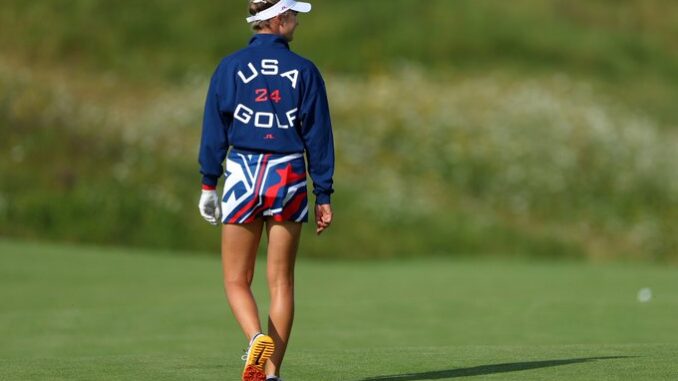
Christina Kim does not accept the premise. The 22-year LPGA veteran is a Nelly Korda supporter, full stop, even as she jokes that she has been on tour almost as long as Korda has been alive. The concept that Korda should be doing more than simply tearing up the circuit at a historic rate—she comes into this week’s U.S. Women’s Open having won six of her last seven starts and is the favorite at Lancaster (Pa.) Country Club—strikes Kim as absurd.
“I’ve always been a fan of people being true to who they are,” Kim said. “And Nelly Korda is, in a word, chill. What’s wrong with someone finding joy and happiness in what they do, and having that sense of wholeness in who they are?”
As to the concept that she’s leaving exposure on the table, Kim balks.
“If anything, she’s the perfect ambassador for our game,” she said. “She has integrity, she will absolutely murder you on the golf course, and there’s no gamesmanship, no snark. She has a good and kind soul.”
This rousing endorsement of Korda can be seen as Exhibit A for the defense. Pitted against that perspective is the quiet but growing concern in certain corners of women’s golf that Korda does bear a deeper responsibility for promoting her sport, and that by resisting a bigger stage—turning down media opportunities both small and massive, and maintaining a wary distance in those she accepts—she has failed to capitalize on an unprecedented moment. And Kim’s perspective as a colleague is different from what you might hear from those in marketing or the media. What she sees as “chill,” others see as insularity or detachment. Both arguments have their compelling points, and definite answers are hard to come by.
Team Korda opted not to participate in this story, which is fair enough; she’s not the first high-profile athlete to turn down an interview around an important event. What’s remarkable about the Korda team writ large, though, is how effectively they’ve built a wall around themselves, how tough it is to penetrate that wall even for journalists who have worked the LPGA beat for years and how their emphasis on privacy clashes with her emergence in 2024 as a superstar in a sport that greatly craves exposure.
She is the greatest player in today’s game by far, and she may be on a journey to becoming one of the greatest ever. Yet in a social media age, at a boom time for women’s athletics, the 25-year-old has defied the odds and remained a cipher even within professional golf.
Korda’s hope is that on-course success is enough.
“I’m just out here doing what I love and hopefully that’s what grows the game naturally,” she said in May. “I’m not trying to push anything. I hope that people see me for who I am and that I love this game.”
But what if, as some contend, that’s notenough? What if women’s golf needs not just dominant victories, but a dynamic superstar, its own version of Tiger Woods? There are inevitable comparisons made to Caitlin Clark—google the phrase “Caitlin Clark moment” with “Nelly Korda” to experience the deluge—but Clark carries herself with an engaging swagger that seems to perfectly align with the surge of women’s sports. That’s not Korda, and whispers that it should be, that she should flip a personality switch for the betterment of the women’s game, sound optimistic to the point of delusion. To many like Kim, it also feels unfair.
Still, it’s easy to understand the quandary for those who cover and promote women’s golf. They have in their presence a young American star of unlimited talent—a dream on paper—but one who keeps the outside world at arm’s length.
“I would say that in terms of media, she doesn’t want to do it,” one reporter said. “But more importantly, she doesn’t understand the Spider-Man line, ‘with great power comes great responsibility.’”
What do you do with a star like this?

There is a notable dearth of in-depth features about Nelly Korda for someone so accomplished, much less someone from such an exceptional athletic family. Her father Petr was a grand slam tennis champion, her mother Regina reached the top 30 in women’s tennis, her older sister Jessica is a six-time LPGA winner, and her younger brother Sebastian is currently the 28th-ranked men’s tennis player in the world. The name “Korda” should resound far more than it does in our celebrity-obsessed culture, and their relative obscurity is tribute to a clannish kind of vigilance—justified, some would argue—when it comes to outsiders.
Korda is not a complete media hermit; she is less available than your average superstar and strictly businesslike with print media, but we can still watch her appearances from a distance and try to read between the lines. In less formal videos with outlets like Barstool, she comes off as likable, with a sneaky sense of humor and an engaging laugh that’s part nervous, part exuberant. She also reads as fundamentally shy; she’s been in the public eye long enough that she doesn’t seem uncomfortable with small talk and joking, but there’s enough reticence to make clear that it’s not her natural inclination. (One person who worked with her on an off-course project said it was clear that she didn’t love the spotlight, but that she had a surprising magnetism and was a “nice, low key” person who was the same off camera as on.)

Leave a Reply